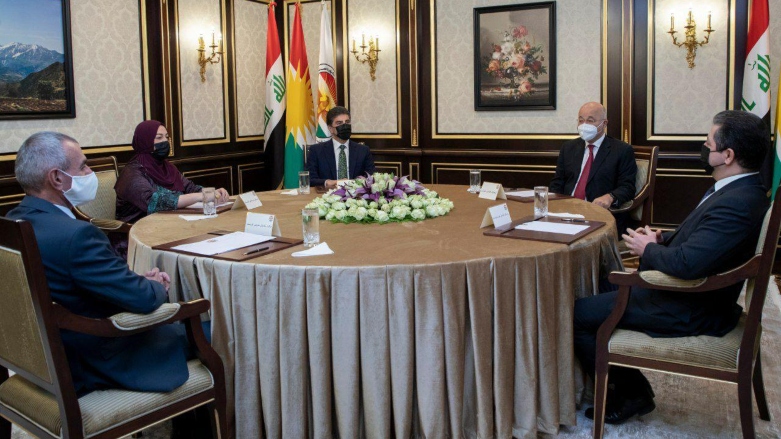Iraqi president meets Kurdish leadership to discuss pressing issues

ERBIL (Kurdistan 24) – Iraqi President Barham Salih traveled to Erbil on Monday to meet with the leadership of the Kurdistan Region. They discussed the most pressing issues that the Region and Iraq are currently facing, including security, political, economic, and health issues.
The President of the Kurdistan Region, Nechirvan Barzani, along with Prime Minister Masrour Barzani, and Speaker of Parliament Rewaz Faiaq, met with Salih at the office of the Kurdistan Region’s Presidency in Erbil, a statement from that office explained.
Kurdistan Region's President, Prime Minister, Speaker of Parliament meet with Iraq's President to discuss the latest political, economic, and health developments across Iraq.
— Kurdistan 24 English (@K24English) October 12, 2020
?KRG pic.twitter.com/OYP503AziA
Security
The Kurdish leadership “reiterated” its support for Iraq’s federal government and its constitutional institutions in protecting the security and stability of the country, “particularly providing secure and stable conditions for diplomatic missions and embassies working in Iraq.”
That sentence referred to the US demand—made in telephone calls by Secretary of State Mike Pompeo to Salih and then to Iraqi Prime Minister Mustafa al-Kadhimi—that the Baghdad government had to stop militia attacks on US and Coalition targets, otherwise the US would close its embassy in Baghdad; move its diplomatic activities to Erbil; and launch a major attack on the militias that have been carrying out those assaults.
Read More: US will close Baghdad embassy—but keep Erbil consulate open
The participants also welcomed the latest agreement between the Kurdistan Regional Government (KRG) and Iraq’s Federal Government to normalize the situation in Sinjar (Shingal), including “the return of internally displaced Yezidis,” according to the press release.
Read More: KRG and Baghdad reach administrative, security agreement on Sinjar
They also emphatically “rejected any attempt to change the demography of the disputed territories.” The regime of the ousted dictator, Saddam Hussein, had a deliberate “Arabization” policy, in which Kurds were driven out of the area, and Arabs brought into it.
They also asked the federal government to provide security and stability in the disputed territories, according to the statement from the office of the Kurdish presidency.
The participants also condemned the assassination last week of the Kurdistan Region’s top border official in Duhok province, Ghazi Salih Ali Khani. KRG security forces have charged that the Kurdistan Workers’ Party (PKK) was behind Khani’s assassination.
Read More: Kurdistan Region says PKK behind assassination of border official
Political situation
Preparations for Iraq’s early elections were also discussed, and the Kurdish leadership expressed support for paving a way “for a successful election.”
Kadhimi has announced that elections will be held in Iraq in June 2021 and that one of his cabinet’s key tasks is to hold such a vote.
The meeting’s attendees also agreed to continue ongoing talks to resolve the issues in the disputed territories and implement Article 140 of the Iraqi constitution.
The meeting affirmed that “protecting the rights of all the components [in the disputed territories] and providing a suitable atmosphere for coexistence” was necessary.
The participants also noted the ongoing talks between the Iraqi government and KRG and expressed their support for the efforts of both Erbil and Baghdad to find a “lasting solution” to the issues remaining between them in a way that protects “the constitutional rights and entitlements of the people of the Kurdistan Region and Iraq,” the press release stated.
Kurdistan Region
The challenges currently facing the Kurdistan Region were also discussed, including the “COVID-19 pandemic and its implications, especially on the economy of the Region,” according to the statement.
The Kurdish leadership reiterated that in order to overcome those challenges, “unity and consensus among all parties and communities in the Kurdistan Region” is necessary.
Editing by Laurie Mylroie
